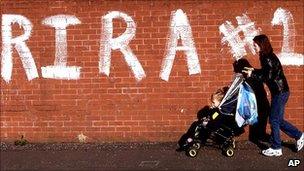Irish terror attack a 'strong possibility'
- Published

Threat levels in Northern Ireland remain 'severe'
The threat level to Britain from Irish-related terrorism has been raised from moderate to substantial.
Home Secretary Theresa May said it meant an attack was a "strong possibility".
It was the first time this threat level had been published, the Home Office confirmed.
The head of security service MI5 warned last week that dissident republicans opposed to British rule in Northern Ireland could strike mainland Britain.
The threat from Irish-related terrorism to Britain is still lower than the overall threat from international terrorism, which remains unchanged at "severe".
'Persistent rise'
The new category of threat from the Irish Republic applies to England, Wales and Scotland but not Northern Ireland, where the level also remains "severe".
Mrs May said: "The director-general of the security service has informed me that he has raised the threat to Great Britain from Irish-related terrorism from moderate to substantial, meaning that an attack is a strong possibility.
"Judgements are based on a broad range of factors, including the intent and capabilities of terrorist groups."
She said the information was being released to encourage people to remain vigilant, and a balance needed to be struck between keeping people alert and not alarming them.
MI5 Director-General Jonathan Evans said last week there had been a "persistent rise" in activity and ambition by dissidents in Northern Ireland over the past three years.
He said they did not have the capacity to return to the levels of violence caused by the Provisional IRA in the Troubles, but presented a "real and rising" security challenge.
Dissident republicans were responsible for more than 30 attacks or attempted attacks on national security targets since the start of the year, compared with about 20 for the whole of last year, he said.
The Real IRA recently hit out at Britain's "colonial and capitalist" system, threatening to target the City of London's financial institutions.
Metropolitan Police Commissioner Sir Paul Stephenson said: "Clearly we have got to be concerned by what Jonathan Evans said."
'Unaccountable agencies'
BBC Belfast correspondent Andy Martin said: "There is no indication that there is a specific target or indeed that there is capability of dissident republicans to mount an attack, but there is no doubt a desire to mount an attack on Britain."
A spokesman for the Police Federation in Northern Ireland said its chairman, Terry Spence, had predicted that the threat would move to Britain.
He said Mr Spence had pointed out that the terrorist threat historically moved to Britain to attack political and economic targets because of the impact it made.
While a series of attacks on the security forces in Northern Ireland had failed, two soldiers and a policeman had been shot dead, he added.
Northern Ireland First Minister Peter Robinson said the upgraded terror threat was a worrying sign which underlined the need for adequate police resources to "stamp it out".
Shadow Northern Ireland secretary Shaun Woodward said however serious the threat posed to Britain, we should recognise that the peace process has changed Northern Ireland forever.
"Now our task is to ensure that those who wish to use violence to destroy not only the politics, but the peace, will never succeed," he said.
Nationalist SDLP leader Margaret Ritchie claimed MI5 was not sufficiently in control of the threat.
"The threat on this side of the Irish Sea is far too severe for us to leave it to unaccountable agencies with a shady past in the north," she said.
Conservative MP Patrick Mercer, a former Army officer who served in Northern Ireland, gave his view on the rise in the threat level to BBC Two's Newsnight.
He said: "The security forces will have seen either the movement of personnel, or the movement of equipment - weaponry, probably explosives in this case - the hi-jacking of vehicles and the preparation of vehicles, or probably a combination of two or more of those things.
"That will have caused them to change the threat level."